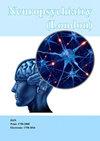Dual Way of Suppressive Action of Antibodies to Serotonin Modulating Anticonsolidation Protein on Drug Addiction in Rats
引用次数: 0
Abstract
Objective Analysis of engagement of serotonin-modulating anticonsolidation protein (SMAP) in formation of drug addiction to morphine in self-administration model in the rats via application of the anti-SMAP antibodies. Methods Indirect ELISA-test, morphine self-administration model, conditioned model of alternative running, conditioned model of instrumental differentiation. Results Upregulation of SMAP by 67% in the brain cingulate cortex of the rats with stable level of morphine intake, while no changes of SMAP level were noticed in hypothalamus. Intramuscular administration of the anti-SMAP antibodies to the rats with stable level of morphine intake leads to significant suppression of morphine consumption for 8 days. Administration of non-immune γ-globulins does not have any effect on morphine consumption. Intra-cerebral administration of the anti-SMAP antibodies leads to significant acceleration and strengthening of memory formation in complicated conditioned alternative running and instrumental differentiation models. Conclusion Application of the anti-SMAP antibodies induces suppression of elaborated drug addiction in the rats, first, through blockade of intra-cellular transduction of serotonin signal in the concerned nervous cells and, second, due to formation of negative memory on inefficacy of lever pressing to get bright positive emotions after morphine self-administration.血清素调节抗巩固蛋白抗体对大鼠药物成瘾的双重抑制作用
目的探讨血清素调节抗巩固蛋白(SMAP)抗体在吗啡依赖模型大鼠体内的作用。方法间接elisa法、吗啡自给药模型、交替跑动条件模型、工具分化条件模型。结果吗啡稳定剂量大鼠扣带皮层SMAP水平上调67%,下丘脑SMAP水平未见变化。对吗啡摄入水平稳定的大鼠肌内注射抗smap抗体,可显著抑制吗啡摄入8天。非免疫γ-球蛋白的施用对吗啡的消耗没有任何影响。脑内注射抗smap抗体可显著加速和加强复杂条件交替跑步和仪器分化模型中的记忆形成。结论抗smap抗体对大鼠复杂药物成瘾的抑制作用,一是通过阻断相关神经细胞内5 -羟色胺信号的转导,二是通过吗啡自给药后杠杆加压获得明亮积极情绪无效而形成负性记忆。
本文章由计算机程序翻译,如有差异,请以英文原文为准。
求助全文
约1分钟内获得全文
求助全文
来源期刊

Neuropsychiatry
NEUROSCIENCES-PSYCHIATRY
自引率
0.00%
发文量
0
审稿时长
>12 weeks
期刊介绍:
Neuropsychiatry is a bimonthly, peer reviewed, open access Journal aimed at exploring the latest breakthroughs in brain and behavior in order to enhance our current understanding of the disturbances in brain function. The Journal has established itself among the most authoritative journals in the field by publishing cutting-edge research in neuropsychiatry and also serves as a forum for discussing the latest advancements and problem statements in the field.
 求助内容:
求助内容: 应助结果提醒方式:
应助结果提醒方式:


